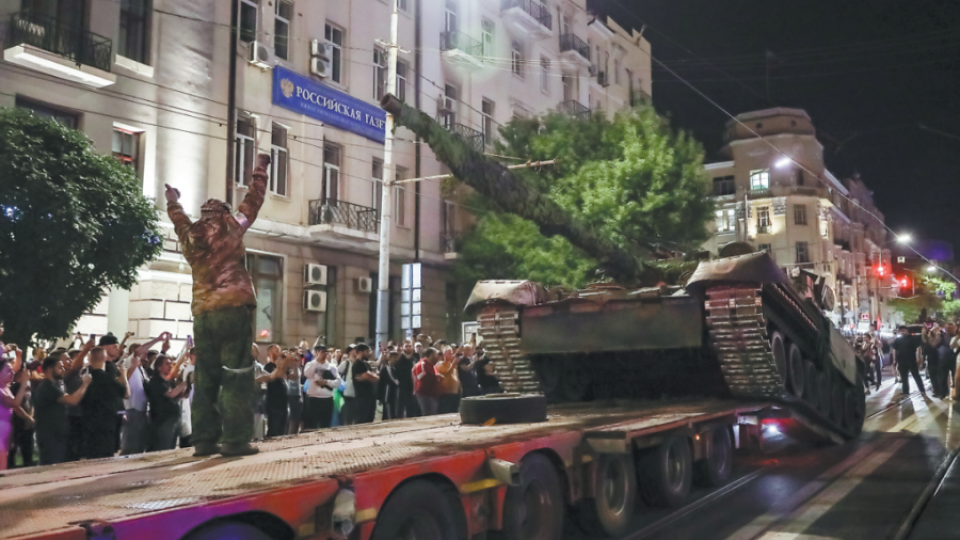June 26, 2023
MOSCOW – China expressed its support for Russia’s efforts in maintaining its stability, a Foreign Ministry spokesperson said on Sunday, a day after a rebellion by a Russian mercenary force was resolved peacefully.
A compromise was reached on late Saturday between Moscow and Yevgeny Prigozhin, head of the Wagner private military group, through the mediation of Belarusian President Alexander Lukashenko.
In response to the latest situation in Russia, the Foreign Ministry spokesperson said in a statement that “this is Russia’s internal affair”.
“As Russia’s friendly neighbor and comprehensive strategic partner of coordination for the new era, China supports Russia in maintaining national stability and achieving development and prosperity,” the spokesperson added.
Russia’s Deputy Foreign Minister Andrei Rudenko met with Chinese State Councilor and Foreign Minister Qin Gang in Beijing on Sunday. They discussed “international and regional issues of common concern”, the Chinese Foreign Ministry said in another statement on its website.
Early on Saturday, a video showed Wagner fighters under Prigozhin’s command moving unimpeded into the Russian city of Rostov-on-Don and advancing hundreds of kilometers toward Moscow. Convoys transporting tanks and armored trucks smashed through barricades set up to stop them.
Russian President Vladimir Putin informed his Belarusian counterpart of the situation and the two heads of state agreed on joint action, according to local media.
“The president of Belarus held talks with Yevgeny Prigozhin. … They came to an agreement on the inadmissibility of unleashing a bloody massacre on the Russian territory,” Lukashenko’s press service was quoted as saying by local media.
Wagner fighters had left southern Russia’s Rostov region by Saturday night and were headed to their field camps, according to Russia’s TASS news agency.
“In 24 hours, we got within 200 km of Moscow. In this time, we did not spill a single drop of our fighters’ blood,” Prigozhin, dressed in full combat uniform, said in a video shot at an undisclosed location. “Understanding… that Russian blood will be spilled on one side, we are turning our columns around and going back to field camps as planned.”
The situation in downtown Rostov-on-Don, where men in camouflage and military equipment were seen on Saturday morning, stabilized by Saturday midnight, a TASS reporter said on Sunday.
“The attempted armed mutiny in our country has aroused strong disapproval in Russian society, which firmly supports President Vladimir Putin,” the Russian Foreign Ministry said in a statement on Saturday.
The statement warned Western countries against attempts to use Russia’s internal situation for their vested interests. Such attempts would be futile and evoke no support either in Russia or among rational political forces abroad, it said.
Kremlin spokesman Dmitry Peskov said that under the deal brokered by Lukashenko, the criminal case opened against Prigozhin for armed mutiny will be dropped, Prigozhin will move to Belarus, and Wagner fighters who joined his “march for justice” will face no action in recognition of their previous service to Russia.
Peskov said that Lukashenko had offered to mediate, with Putin’s approval, because he had known Prigozhin personally for around 20 years.
“There was a higher goal to avoid bloodshed, to avoid internal confrontation, to avoid clashes with unpredictable results. It was for the sake of these goals that Lukashenko’s mediation efforts were made, and President Putin made the appropriate decision,” the spokesman said.
“An agreement has been reached that Wagner troops will return to their camps and places of deployment. Some of them, if they wish to do so, can later ink contracts with the (Russian) Defense Ministry,” he said.
The incident with the Wagner group will not affect the course of Russia’s special military operation in Ukraine, which will continue, Peskov stressed.
Russian state television on Sunday showed Putin expressing confidence in his plans for Ukraine in an interview that appeared to have been recorded before Saturday’s aborted revolt by the Wagner private military group.
“We feel confident and, of course, we are in a position to implement all the plans and tasks ahead of us,” Putin said. “This also applies to the country’s defense, it applies to the special military operation, it applies to the economy as a whole and its individual areas.”
The comments in an interview with Kremlin correspondent Pavel Zarubin were broadcast by Rossiya state television.
The short report did not mention Saturday’s revolt, in which Wagner fighters took a southern city and headed for Moscow hours before their leader Prigozhin reached a compromise with the Kremlin to go into exile.
Earlier, Prigozhin said his “march” on Moscow was intended to remove corrupt and incompetent Russian commanders he blames for botching the conflict in Ukraine.
Ukrainian President Volodymyr Zelensky said the developments, which sparked a flurry of high-level calls among Western leaders, exposed the turmoil in the heart of Russia. United States President Joe Biden spoke with the leaders of France, Germany and the United Kingdom, while US Secretary of State Antony Blinken spoke with his G7 counterparts.


